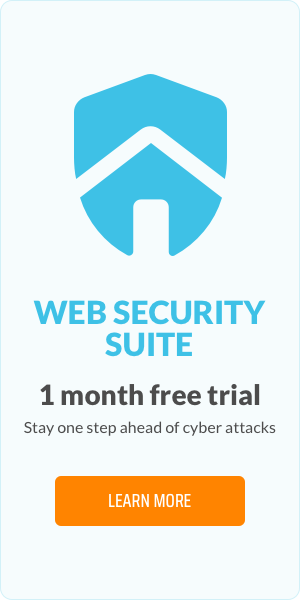Small business security tips for preventing malware threats

Small business owners, beware! Your website is especially vulnerable to malware. If you’ve not invested in the resources necessary to keep your website safe, a malware attack could severely cripple, even end, your business. Here are the cybersecurity solutions you need to fight this common threat.
What is malware?
Malware is an abbreviation for “malicious software.” The term “malware” can refer to any kind of malicious software used to gain access to your system and cause damage. Trojan Horses, ransomware, and viruses all fall under the umbrella of “malware”. Some commonly used forms of malware used to target small business websites include:
Macro malware
Macro malware is often transmitted through email attachment which might resemble invoices, legal documents, or other important documents you’ll be inclined to open.
Online banking malware
Other forms of malware, like online banking malware, directly target your computer or device via a phoney website. You may think you’re imputing data into your bank’s website but, in reality, you’re providing hackers with all the information they need to access your account.
Ransomware
This form of malware limits or altogether prevents you from being able to access your system until you pay a ransom. File types may be encrypted, hackers forcing users to pay a ransom through an online ransom in order to receive the decryption key.
Mobile malware
Mobile devices open other points of entry for hackers. Laptops, tablets, and phones are usually infected via rogue web pages or malicious native applications. If you open a suspicious email and click on a link from a smartphone or tablet, it may try to run a background operation and infect your system.
Responsive malware
Responsive malware is another serious mobile security threat. Whereas mobile malware infects the mobile device itself, responsive malware enters your system via SQL injection or cross-site scripting invasion of the server and files. Desktop users won’t see it but mobile users will since they are viewing a responsive layout version of your website.

Small businesses prime target for malware attack
A recent Verizon report shows that small business websites are especially vulnerable to malware threats. Key findings include:
- Small business websites accounted for 43 percent of data breeches between November 2017 and October 2018
- Retail, accommodation, and healthcare were the most frequently targeted sectors
- Any small businesses making large vendor payments or wire transfers are particularly vulnerable
- Any small business storing sensitive customer information (financial information, health data, intellectual property) are equally vulnerable
- 71 percent of malware attacks were financially motivated
Left undetected, malware will cause irreparable damage to your small business:
- Business disruption: Most business cannot operate without the data stored on their computers. Could your business afford to be shut down for a day, or even half a day?
- Financial costs: Your business could be forced to pay damages to employees and customers who have had their data stolen. Could your business take this kind of hit?
- Extortion losses: Ransomware demands average between $500 – $2,000 US dollars. If like most small business owners you're working with limited resources, this could prove a costly financial blow.
- Reputation damage: Your reputation will undoubtedly take a hit if hackers get their hands on sensitive customer information, information they have entrusted you to safeguard.
- Google blacklisted: Google will quarantine your site if it thinks it is infected with malware. Your site will be flagged or removed, which means your search rankings will plummet.
Protect your small business from malware
Choose a service provider who emphasises security
Only use an SSL certificate provider who works with a trusted Certificate Authority, such as GlobalSign. Use DNS services which employ DNSSEC to confirm data. Choose a web hosting plan with strong security features like intrusion prevention, security advisor, firewall, or other security tools which intercept threats.
Backup, backup, backup
If EuroDNS is your web hosting provider, we automatically provide regular backups for you. But the web hosting control panel included with our Core Shared and Advanced Web Hosting plans offer simple ways for you to self-manage backups according to your own needs. You can backup domain configuration, data, and email.
Establish a cybersecurity plan for your business
Small business owners have a lot on their plates and, unfortunately, creating a cybersecurity plan tends to get pushed to the side. But putting policies in place and training employees on all procedures must be a priority: acceptable use of email and the Internet, secure password creation, protocols for safe access over remote, unsecured networks. Every employee should be trained on how they can help to keep your business safe.
Small businesses are often sitting ducks because they lack the proper resources to fend off malware attacks. But even taking just a few basic steps can help protect your business from malware and other cybersecurity threats. If you have additional questions or need assistance combatting this security threat, let us know. We'll be glad to help.
5 ways to protect your small business from cyber attacks
Related articles:
